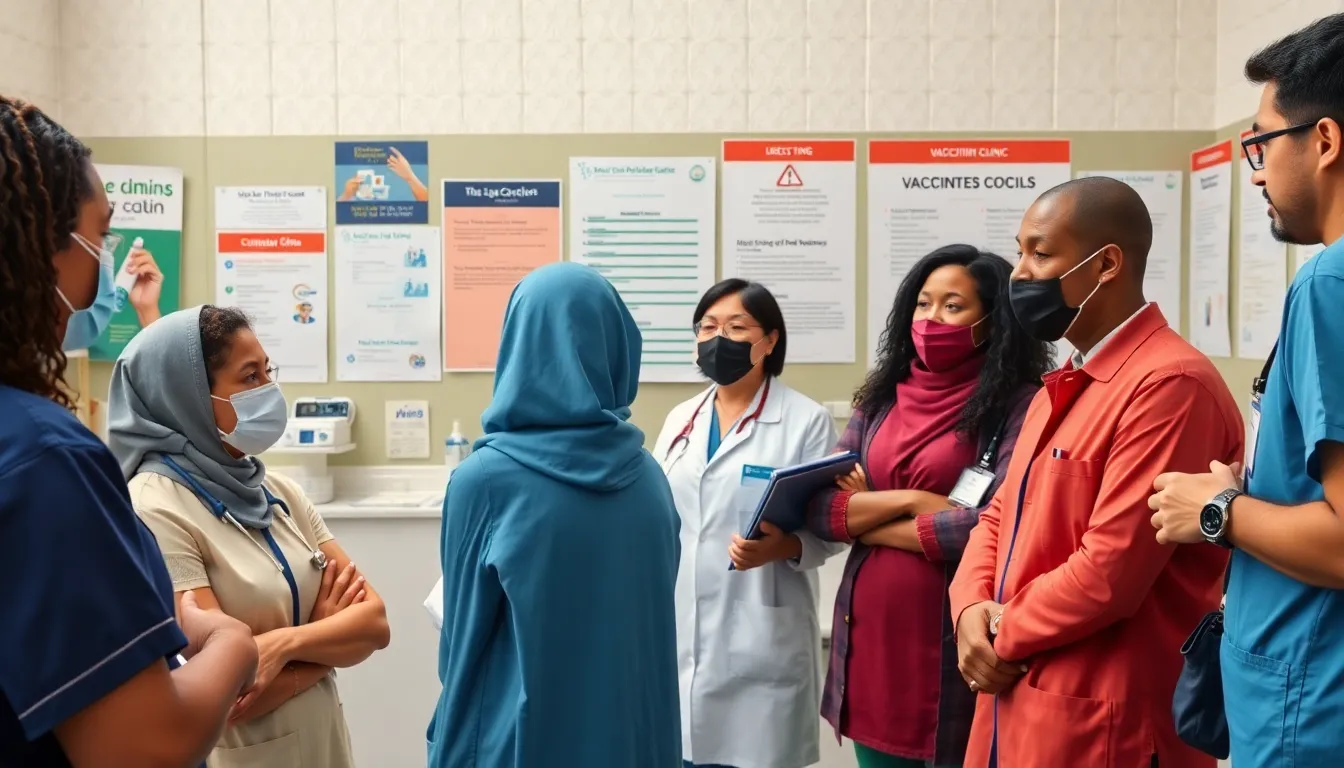Table of Contents
ToggleIn a world overflowing with information, finding trusted vaccine resources can feel like searching for a needle in a haystack—if that haystack were also on fire. With so many opinions and headlines flying around, it’s easy to get lost in the chaos. But fear not! There are reliable sources that cut through the noise and deliver the facts you need, minus the drama.
Understanding Trusted Vaccine Resources
Trusted vaccine resources provide accurate information to individuals seeking clarity in their health decisions. The Centers for Disease Control and Prevention (CDC) offers comprehensive guidelines on vaccines, ensuring users access current data about safety and efficacy. The World Health Organization (WHO) serves as an essential international authority, delivering insights and recommendations for various vaccines worldwide.
Local health departments also play a critical role by disseminating reliable information tailored to specific communities. These organizations often address regional health concerns and vaccination campaigns. Additionally, healthcare providers supply personalized advice based on patients’ medical histories, further enhancing informed decision-making.
Peer-reviewed journals deliver scientific research about vaccines, presenting studies that undergo rigorous evaluation from experts. These journals include articles that present findings on vaccine effectiveness and potential side effects, contributing to a deeper understanding of immunization science.
Accredited medical websites, such as Mayo Clinic and Johns Hopkins University, offer user-friendly access to trustworthy vaccine information. Websites maintain updated resources, frequently addressing ongoing concerns about vaccination and public health. Social media platforms can also provide valuable information; however, it’s essential to verify facts through trustworthy sources before drawing conclusions.
Critical evaluation of vaccine sources, including those mentioned, supports the formation of informed opinions. Utilizing multiple resources enhances knowledge about vaccines, fostering confidence in vaccination decisions. With reliable information readily available, individuals can navigate the complexities of vaccine discourse effectively.
Importance of Reliable Vaccine Information
Reliable vaccine information plays a crucial role in ensuring public health and safety. Trustworthy resources guide individuals in making informed decisions about vaccinations, ultimately helping to control disease outbreaks.
Impact on Public Health
Reliable vaccine information fosters community immunity. High vaccination rates lead to herd immunity, protecting those unable to receive vaccinations. Informed populations experience reduced transmission of preventable diseases, leading to significant declines in illness and death rates. According to the CDC, vaccines prevent an estimated 2 to 3 million deaths annually worldwide. Communities benefit from cost savings associated with healthcare expenditures and disease management. Proactive vaccination strategies significantly contribute to long-term public health improvements.
Mitigating Misinformation
Misinformation poses a serious threat to public understanding of vaccination. Trusted resources counteract this by providing accurate, science-based information. By promoting reliable sources, communities can recognize and debunk myths effectively. Educational campaigns reinforce the importance of vaccines, clarifying common misconceptions. Engaging healthcare professionals in discussions enhances trust and helps clarify doubts. Encouraging critical evaluation leads to a more informed audience. Organizations like the WHO and CDC provide resources that directly address common vaccine fears.
Key Trusted Vaccine Resources
Reliable vaccine information is essential for making informed decisions. Several key resources provide factual guidance.
Government Health Agencies
Federal and state health agencies offer authoritative vaccine recommendations. The Centers for Disease Control and Prevention (CDC) shares vaccination schedules and safety data. Regular updates keep the public informed about new vaccines and emerging health threats. The World Health Organization (WHO) supports global vaccination efforts and provides guidance based on the latest research. Local health departments can also provide targeted information specific to communities. By accessing these agencies, individuals gain trusted insights into vaccination practices.
Non-Profit Organizations
Non-profit organizations play a vital role in educating the public about vaccines. The American Academy of Pediatrics offers resources tailored for parents and caregivers, emphasizing the benefits of childhood vaccinations. Immunization Action Coalition actively disseminates information to healthcare providers and the public. Their resources clarify vaccine myths and address common concerns. Organizations like the Vaccine Education Center focus on providing science-based facts. Engaging with these non-profits enhances understanding and encourages vaccine acceptance.
Educational Institutions
Educational institutions contribute significantly to vaccine knowledge. Universities often conduct research that leads to published studies on vaccine efficacy and safety. Many provide online resources and articles designed for public consumption. Medical schools train future healthcare providers on the importance of vaccinations in public health. Collaboration with health departments helps align educational materials with community needs. By leveraging the expertise of these institutions, individuals can access credible information to guide their vaccination choices.
How to Evaluate Vaccine Resources
Evaluating vaccine resources ensures the accuracy and reliability of information. Trustworthy information plays a critical role in making informed vaccination decisions.
Checking Credentials
Verifying the credentials of the source is vital. Look for organizations or authors with recognized expertise in vaccination or public health. Federal agencies like the CDC or WHO provide well-researched guidelines. Peer-reviewed journals also reflect quality research and authoritative studies. Non-profit organizations, such as the American Academy of Pediatrics, focus on educating the public. Additionally, check for affiliations with accredited medical institutions. These factors contribute to establishing credibility.
Cross-Referencing Information
Cross-referencing information enhances reliability. Compare data from multiple trusted sources to highlight consistency. Discrepancies might indicate misinformation, requiring more scrutiny. Consider checking the CDC alongside trusted medical websites, like Mayo Clinic. Gathering perspectives from local health departments enriches understanding as well. Look for consensus among these entities to ensure the information aligns with scientific consensus. Engaging with healthcare professionals also provides personalized insights based on trustworthy resources.
Conclusion
Accessing trustworthy vaccine resources is essential for making informed decisions about health. Individuals can navigate the complex landscape of vaccine information by relying on reputable organizations and expert guidance. Utilizing resources like the CDC and WHO ensures that they receive accurate and up-to-date information.
Engaging with local health departments and healthcare providers further personalizes the experience and reinforces confidence in vaccination choices. By critically evaluating sources and cross-referencing information, individuals can combat misinformation effectively. This proactive approach not only supports personal health but also contributes to the broader goal of public health and safety.








